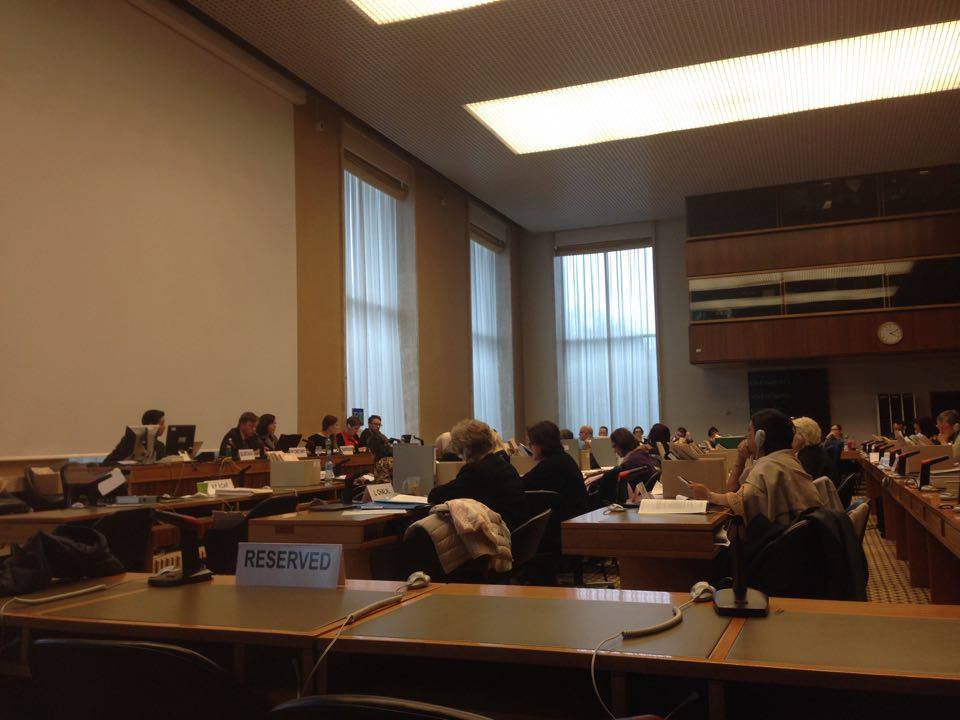Czech Republic: Government questioned on forced sterilisation and violence against women
This week, the Czech Republic was reviewed by the United Nations Committee on the Elimination of Discrimination against Women (CEDAW) – the authoritative international body on the rights of women. MDAC and partners raised serious and systematic human rights violations against girls and women with mental disabilities in the country including forced sterilisation, segregated education of 30,000 children and denial of family rights.
 Czech Republic under review at 63rd CEDAW session in Geneva. © FORUM for Human Rights.
Czech Republic under review at 63rd CEDAW session in Geneva. © FORUM for Human Rights.
Last month, MDAC and FORUM sent detailed information to the women’s rights committee on the Czech Republic’s failure to satisfy key standards set out in the UN Convention on the Elimination of All Forms of Discrimination Against Women (CEDAW Convention).
The forced sterilisation of women, including those with disabilities, featured multiple times in the formal meeting between the UN body and the Czech Government. The practice took place as an officially authorised policy during the communist regime in former Czechoslovakia, and continued after the country’s transition to liberal democracy. Recent plans to create a national compensation mechanism for victims of this state practice were dropped after being rejected by the Czech Parliament. In its response to questions from the CEDAW Committee, the Czech Government said that it was difficult to identify victims, and that there was a lack of concrete data on how many women with disabilities were affected by such a practice.
Yet, the practice of sterilisation without informed consent is still allowed to take place in the Czech Republic against women with disabilities, and specifically those placed under guardianship. MDAC and partners have pointed out that allowing guardians to give consent amounts to forced sterilisation, a fundamental invasion on the bodily integrity of women with disabilities in the country. MDAC calls for an effective approach to identifying victims of forced sterilisation, and for reparations and compensation to be provided. The current provisions allowing substitute consent for invasive procedures must also be abolished.
MDAC’s report to the Committee in collaboration with FORUM also focused on the fact that 30,000 children with disabilities are educated in segregated settings in the Czech Republic. Responding to questions from the CEDAW Committee, Czech representatives stated that a new law will come into place to reform the education system, providing budgets to integrate some children with “special educational needs” into mainstream classrooms.
Though these plans are a step in the right direction, they do not go far enough. The legislation still allows for children with disabilities to be placed in so-called ‘special schools’, denying them the right to be educated alongside their careers and setting them on a trajectory of lifelong segregation. In 2009, the Czech Republic undertook to ensure that all children, including girls with disabilities, benefit from education provided in inclusive schools, yet there is much further to go. The CEDAW Committee has an opportunity to make clear to the Czech Government that all children have a right to be educated in inclusive settings.
The restriction of family rights of women with disabilities in the country also featured prominently in the dialogue. In a report MDAC and FORUM sent to CEDAW Committee last year, it was highlighted that discriminatory Czech legislation can mean the removal of parental and marriage rights for women with disabilities. The report points out that women with mental health issues are particularly affected by such practices in the country. MDAC calls on the Czech Government to abolish all legislation which prevents women with disabilities exercising family rights on an equal basis with others.
Other issues that featured prominently included multiple forms of discrimination faced by Romani girls and women, policies relating to women refugees and migrants, and trafficking. The CEDAW Committee is expected to release recommendations to the Czech Government in the coming months.

